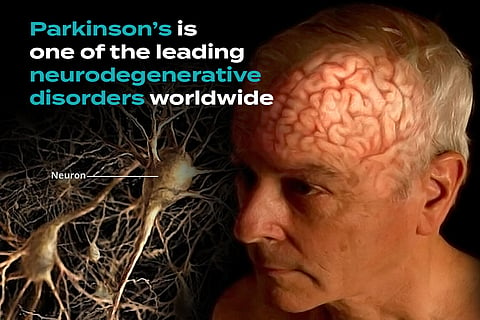Bridging the Gap - Health Equity for all
Parkinson’s Disease: A Dopamine-Depleting Neurodegenerative Disorder
<p>Rigid, slow, and shaky — so goes the experience of Parkinson’s disease (PD), a condition first described by Dr James Parkinson in 1817. It’s one of the most common neurodegenerative disorders and affects millions worldwide. </p>
<p>Several celebrities have been afflicted with PD, and their high-profile struggles have highlighted its inhibiting nature and the need for more research. Below is a rundown of the disorder and some famous people who have lived with it.</p>
<h2>The eternal tremor of Parkinson’s disease</h2>
<h3>Symptoms</h3>
<p>PD has dozens of associated symptoms that vary from person to person, and they progressively get worse over time. The most common include:</p>
<ul>
<li><strong>Tremors</strong>. Involuntary shaking that usually starts in the hands or fingers.</li>
<li><strong>Slow movement.</strong> Also known as bradykinesia, this makes simple tasks more challenging.</li>
<li><strong>Rigidity.</strong> Stiffness and resistance in the muscles and a decreased range of motion.</li>
<li><strong>Postural issues.</strong> Poor balance and coordination, which increase the risk of falls.</li>
<li><strong>Changes in speech.</strong> Speech may be slurred or expressed in a softer voice.</li>
<li><strong>Impaired fine motor skills.</strong> Precise movements like writing or buttoning clothes are difficult.</li>
<li><strong>Other issues.</strong> For example, depression/anxiety, sleep issues, and constipation.</li>
</ul>
<figure><img alt="" height="474" src="https://cdn.storymd.com/optimized/JA0QxXHOo9/original.png" width="741" />
<figcaption>Parkinson disease symptoms <em>Source: CarrotsMitHummus/Wikimedia</em></figcaption>
</figure>
<h3>Causes</h3>
<p>We don’t know the exact cause of PD, but the suspicion is that it is a combination of genetic and environmental factors. Research suggests that certain mutations may amplify the risk of developing the condition. Exposure to toxins like heavy metals or pesticides may also be a contributing factor.</p>
<h3>Dopamine loss</h3>
<p>A central tenet of Parkinson’s is the loss of dopamine-producing neurons in the brain. Dopamine is an important neurotransmitter that is critical for many bodily functions, including movement and coordination. Low dopamine levels can have knock-on effects for movement.</p>
<p>Research shows that most people with PD lose somewhere between 60% and 80% of cells responsible for producing dopamine in the substantia nigra (part of the brain’s structure that controls movement) by the time they present symptoms. </p>
<h3>Management of Parkinson’s disease</h3>
<p>We don’t have a cure for Parkinson’s, but several treatment options are available to manage symptoms and improve quality of life. </p>
<ul>
<li><strong>Medications</strong>. Drugs like dopamine agonists can assist with alleviating symptoms by resupplying dopamine levels or mimicking its effects.</li>
<li><strong>Physio.</strong> Dedicated programs can improve strength, flexibility, and balance in people with PD, helping to manage motor issues and reduce the risk of falls.</li>
<li><strong>Speech therapy.</strong> Some techniques can help individuals with PD to improve their speech clarity and volume.</li>
<li><strong>Deep brain stimulation (DBS)</strong>. Only applied in certain cases, DBS may be recommended to implant electrodes in specific parts of the brain. This may help to regulate abnormal brain activity connected to PD symptoms.</li>
<li><strong>Lifestyle modifications.</strong> A healthy diet, regular exercise, and stress management contribute to overall wellbeing and may improve some symptoms of PD. Tai chi, yoga, and massage therapy can also help.</li>
</ul>
<h2>Celebrities with Parkinson’s disease</h2>
<h3>Michael J. Fox</h3>
<p>One of the biggest voices in awareness of PD, Michael J. Fox is a Canadian-American actor most famous for his roles in ‘80s classics like Back to the Future and TV shows like Family Ties and Spin City. He was diagnosed with PD in 1991 at the age of 29, and worsening symptoms eventually forced him to limit his acting work.</p>
<figure><img alt="" height="503" src="https://cdn.storymd.com/optimized/Kq2nGZsLq5/original.jpg" width="375" />
<figcaption>Michael J. Fox <em>Source: Steve Pyke</em></figcaption>
</figure>
<p>Fox has since become a leading activist for PD research through the Michael J. Fox Foundation. As of 2023, the organization has reportedly raised over $2 billion.</p>
<h3>Muhammad Ali</h3>
<p>The legendary boxer is perhaps the most famous face of PD ever. His diagnosis was in the mid-1980s, several years after his retirement. Iconic for his speed, power, and agility, the visible effect of PD on Ali’s movement and capacities sent a powerful message about the disease.</p>
<p>Despite his diagnosis, Ali remained active in public life and as an advocate for awareness of PD until his death in 2016. </p>
<h3>Linda Ronstadt</h3>
<p>Ronstadt is a Grammy-winning singer-songwriter known for her versatile vocal talents and numerous hits. She revealed her PD diagnosis in 2013 and has intimately shared the effects the disease has had on her life and music.</p>
<h3>Alan Alda</h3>
<p>Alda was a staple feature of film and television in decades gone by, with his most well-known role being Hawkeye Pierce in MAS*H. The 88-year-old actor revealed in 2018 that he had been diagnosed with PD a few years prior. Alda has been open about his journey with PD and continues to advocate for research funding and awareness.</p>
<h3>Janet Reno</h3>
<p>Reno was the first female Attorney General of the US, serving from 1993 to 2001. She disclosed her PD diagnosis in 1995 and continued to work in her role while managing the disease. She passed in 2016 due to complications related to PD.</p>
<h2>Research and future directions</h2>
<p>As brave as those people’s stories are, they are unnerving in their detail about how damaging the disease can be. The positive is that significant advances in neuroscience and medical tech continue to force progress in our understanding and treatment of the disorder.</p>
<h3>Areas of investigation</h3>
<p>For example, a major area of investigation is neuroprotective therapies that could halt or slow down the progression of the disease. Neuroprotective agents that preserve dopamine-producing neurons or target underlying disease processes are key points of interest.</p>
<p>Efforts are also underway to identify reliable biomarkers, understand the genetic basis of the disorder, and develop precision medicine tailored to the individual.</p>
<h2>More on Parkinson's Disease</h2><ul><li><a href="https://soulivity.storymd.com/journal/5mryyx6uzj-parkinson-s-disease" target="_blank">Parkinson's Disease: Causes, Symptoms, Prognosis</a></li><li><a href="https://soulivity.storymd.com/journal/2wzg4ag0lj-degenerative-nerve-diseases" target="_blank">Common Degenerative Nerve Diseases</a></li><li><a href="https://soulivity.storymd.com/journal/yj5ddxeinm-movement-disorders" target="_blank">Common Movement Disorders</a></li></ul>


